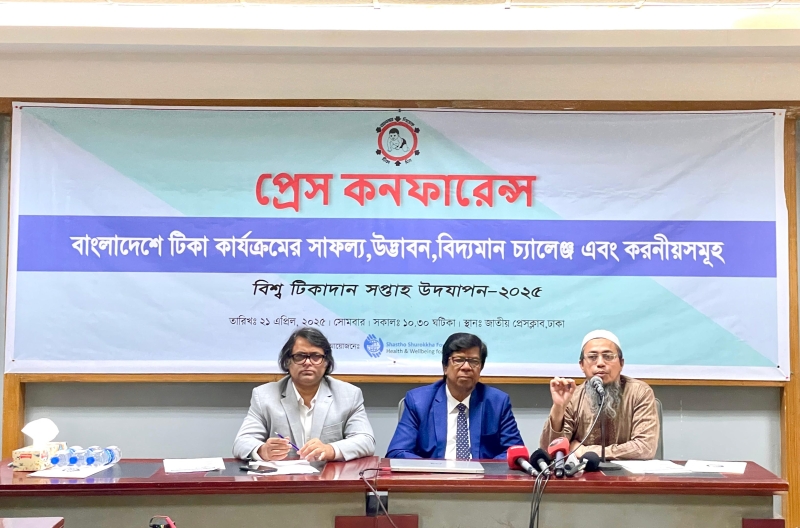- Israel Strikes Tehran with US Support Amid Nuclear Tensions |
- India Sees 9% Drop in Foreign Tourists as Bangladesh Visits Plunge |
- Dhaka Urges Restraint in Pakistan-Afghan War |
- Guterres Urges Action on Safe Migration Pact |
- OpenAI Raises $110B in Amazon-Led Funding |
Vaccination Program Faces Major Setbacks

Bangladesh’s Expanded Program on Immunization (EPI), one of the country's most successful public health initiatives, is facing serious challenges due to staff shortages, poor infrastructure, unequal service distribution, and insufficient funding, according to recent research by UNICEF Bangladesh and the Shastho Shurokkha Foundation.
The study revealed that around 40% of posts under urban and rural vaccination projects remain vacant, while 43% of positions at the EPI headquarters also remain unfilled. This personnel crisis has directly impacted the programme’s ability to reach target populations, especially in high-risk and remote areas.
Despite guidelines from the Urban Immunization Strategy 2019 and EPI Micro-Plan 2024 that recommend six vaccinators per 50,000 people, this standard is yet to be implemented. Delays in budget allocation, driven by the ongoing preparation of the new Health Sector Plan, have further slowed vaccine procurement, transport, and distribution.
At a press conference held at the Jatiya Press Club on Monday, Dr. Nizam Uddin Ahmed, Executive Director of the Shastho Shurokkha Foundation and research project director, highlighted both the progress and the persistent challenges of the immunisation programme. He called for urgent and coordinated action to protect the gains made over the last four decades.
The event, jointly organised by the Shastho Shurokkha Foundation and UNICEF Bangladesh under the EPI’s supervision, was held under the theme “Immunization for All is Humanly Possible.” The press conference aimed to raise awareness about the successes, current gaps, and necessary steps to strengthen immunisation efforts across the country.
Launched on World Health Day in 1979, EPI has led to the elimination and control of several vaccine-preventable diseases. With support from UNICEF, the programme has introduced several digital innovations, including Vax-EPi, e-TrakAR, GIS-based micro-planning, and e-VLMIS. According to a 2023 investment case study, each dollar invested in EPI yields $25.40 in economic returns.
Immunisation coverage, once below 2% in 1985, rose to 83.9% by 2019, as per the Coverage Evaluation Survey. However, significant disparities remain between urban and rural areas. Alarmingly, EPI coverage has not exceeded 84% in the last 12 years, leaving approximately 16% of children unvaccinated.
The study warned that unless the government prepares to take over GAVI’s support post-2029, immunisation financing will be at serious risk. The absence of robust monitoring and evaluation systems across underserved populations — such as slum dwellers, hill residents, riverbank and floating communities — is contributing to rising numbers of zero-dose and missed-dose children.
To address these gaps, the study recommends immediate recruitment to fill vacancies, equitable distribution of vaccination centres, uninterrupted vaccine supply, enhanced transport systems, improved cold chain maintenance, and targeted strategies like mobile and door-to-door vaccination in high-risk zones. It also suggests holding evening sessions and weekly campaigns to increase outreach.
Dr. Abul Fazal Md. Shahabuddin Khan, EPI Programme Manager at the DGHS, and Professor Dr. Rafiqul Islam, Policy Advisor of the research, also spoke at the event, stressing the importance of sustained political will and investment to ensure no child is left behind.

